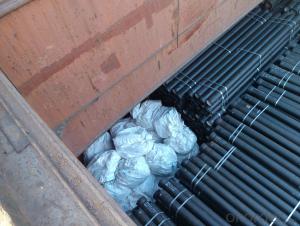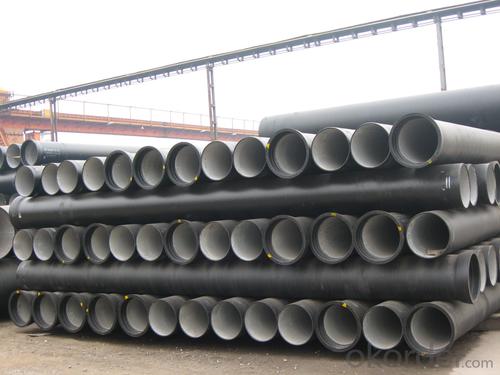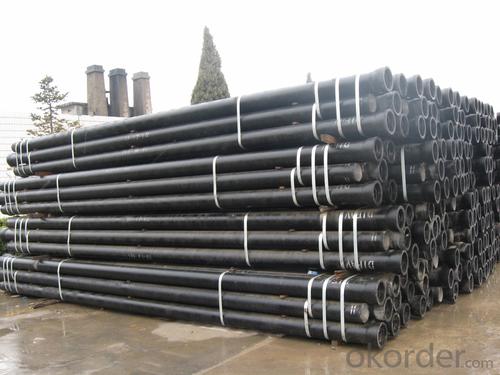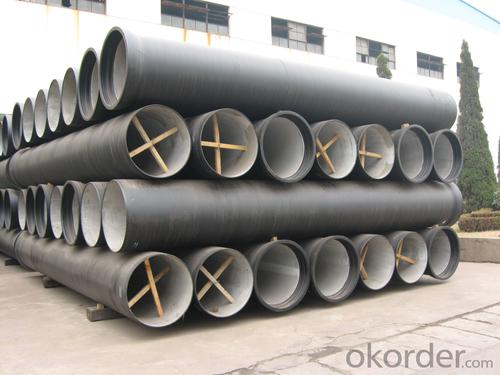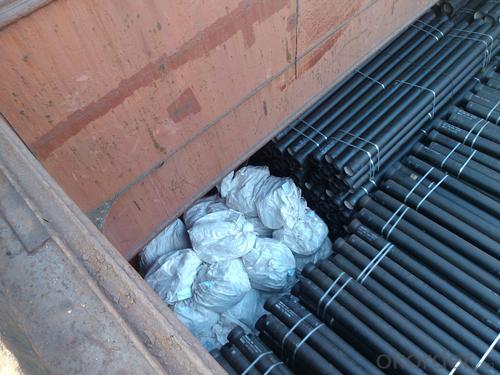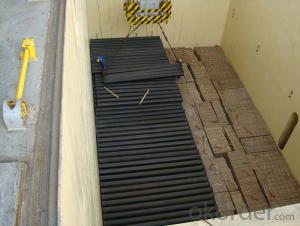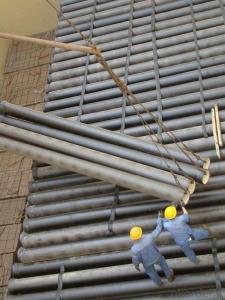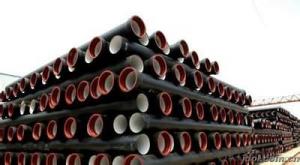DUCTILE IRON PIPE DN800 K9
- Loading Port:
- China Main Port
- Payment Terms:
- TT OR LC
- Min Order Qty:
- -
- Supply Capability:
- -
OKorder Service Pledge
OKorder Financial Service
You Might Also Like
Specification:
1) The standard of pipe: ISO2531:1998, K9
2) Effective length: 6m
3) Inner cement line: Portland cement line as per ISO4179
4) Zinc coating: at least 130g/m2 as per ISO8179
5) Bitumen painting: at least 70um as per ISO8179
6) With 100% quantity of NBR ring, or SBR ring, or EPDM ring as per ISO4633
7) DN80mm-800mm
8) High strength, lighter than grey iron, good corrosion resistance, no furring, small flow resistance, easy fixing, long life tome about 100 yeas
9) Produced by Hangzhou chunfeng machine
10) Checked by automatic inspection equipment
11) Composition:
Chemical composition | | | | |||
Chemical composition | Ductile Cast Iron Pipe (%) | Grey iron pipe (%) | Steel pipe (%) | | | |
C | 3.5-4.0 | 3.2-3.8 | 0.1-0.2 | | | |
Si | 1.9-2.6 | 1.4-2.2 | 0.15-0.4 | | | |
Mn | 0.15-0.45 | 0.4-0.6 | 0.3-0.6 | | | |
P | ≤0.06 | ≤0.3 | 0.02-0.03 | | | |
S | ≤0.02 | ≤0.1 | 0.02-0.03 | | | |
Mg | 0.03-0.06 |
|
| | | |
12) Feature:
Mechanical properties | | | | |||
| Ductile Cast Iron Pipe | Grey Iron Pipe | Steel Pipe | | | |
Tensile Strength(Mpa) | ≥420 | 150-260 | ≥400 | | | |
Yield Strength(Mpa) | ≥300 | No Confirmation | No Confirmation | | | |
Bending Strength(Mpa) | ≥590 | 200-360 | ≥400 | | | |
Elongation (%) | ≥10 | Neglected | ≥18 | | | |
Brinell Hardness(HBS) | ≤230 | ≤230 | About 140 | | | |
13) T type mechanical joint
14) Packing: in bulk or container
- Q: What are the different types of coatings available for ductile iron pipe?
- There are several different types of coatings available for ductile iron pipe, each with unique properties and advantages. 1. Cement Mortar Coating: This is a commonly used coating for ductile iron pipe. It involves applying a layer of cement mortar to the interior and exterior surfaces of the pipe. This coating provides protection against corrosion and abrasion, as well as improving the hydraulic efficiency of the pipe. 2. Polyethylene Encasement: Another popular coating for ductile iron pipe is polyethylene encasement. This involves wrapping the pipe with a layer of polyethylene material. This coating provides excellent corrosion resistance and is particularly effective in protecting against soil and water contaminants. 3. Fusion-Bonded Epoxy (FBE) Coating: FBE coating involves applying a layer of epoxy powder to the pipe surface, which is then heated to create a strong bond. This coating provides excellent corrosion resistance and is commonly used in aggressive environments such as wastewater treatment plants and chemical processing facilities. 4. Zinc Coating: Zinc coating, also known as galvanization, involves applying a layer of zinc to the surface of the ductile iron pipe. This coating provides excellent corrosion resistance and is often used in outdoor applications where the pipe is exposed to moisture and humidity. 5. Bituminous Coating: Bituminous coating is a black, tar-like substance that is applied to the surface of the pipe. It provides protection against corrosion and is commonly used in underground applications where the pipe is in contact with soil or water. 6. Polyurethane Coating: Polyurethane coatings provide excellent resistance to abrasion, impact, and chemical corrosion. They are often used in aggressive environments such as oil and gas pipelines. These are just a few examples of the different types of coatings available for ductile iron pipe. The choice of coating depends on factors such as the intended application, environmental conditions, and the level of corrosion protection required. It is important to consult with industry experts and adhere to relevant standards and specifications when selecting a coating for ductile iron pipe.
- Q: What is cast iron pipe?
- Divided into gray cast iron pipe and nodular cast iron pipe according to different material. According to the interface form, it is divided into flexible interface, flange interface, self anchored interface, rigid interface and so on. Among them, the flexible iron pipes rubber sealing ring; flange interface cast iron pipe flange fixed in the rubber pad, the flange gasket sealing; rigid interface cast iron pipe socket is large, straight pipe is inserted, sealed with cement, this technology has been basically eliminated.
- Q: What is the difference between ductile iron pipes and cast iron pipes?
- Ductile iron pipes and cast iron pipes differ in terms of their composition and physical properties. Ductile iron pipes are made from ductile iron, which is a type of cast iron that contains nodular graphite in its microstructure, making it more flexible and resistant to cracking. On the other hand, cast iron pipes are made from gray cast iron, which has a gray, brittle structure due to the presence of graphite flakes. Ductile iron pipes are stronger, more durable, and less prone to damage, making them suitable for high-pressure applications and areas with heavy traffic loads. Cast iron pipes, although more brittle, are known for their corrosion resistance and are commonly used for water and sewage systems.
- Q: How is ductile iron different from cast iron?
- Ductile iron and cast iron are two types of iron alloys that differ in terms of their composition, properties, and applications. The main difference between ductile iron and cast iron lies in their microstructure and mechanical properties. Ductile iron, also known as nodular cast iron or spheroidal graphite iron, is a type of cast iron that undergoes an additional treatment process to enhance its strength and ductility. This is achieved by adding small amounts of magnesium to the molten iron during the casting process, which results in the formation of graphite nodules throughout the material. These graphite nodules act as stress raisers and prevent the propagation of cracks, making ductile iron more resistant to fractures and providing it with improved ductility compared to cast iron. In contrast, cast iron is a type of iron alloy that contains a higher carbon content than ductile iron. This higher carbon content leads to the formation of graphite flakes within the material, giving cast iron its characteristic brittle nature. Due to its brittleness, cast iron is more prone to cracking and less flexible than ductile iron. However, cast iron has excellent compressive strength and is highly resistant to wear and abrasion, making it suitable for applications where strength and durability are important, such as in engine blocks, pipes, and manhole covers. Another difference between ductile iron and cast iron is their machinability. Ductile iron is generally easier to machine due to its lower carbon content and the presence of graphite nodules, which act as lubricants during the cutting process. On the other hand, the presence of graphite flakes in cast iron can cause tool wear and result in poor surface finish during machining. In summary, ductile iron and cast iron differ in their microstructure, mechanical properties, and applications. Ductile iron offers improved ductility and resistance to fractures, making it suitable for applications requiring flexibility and impact resistance. Cast iron, with its higher carbon content and graphite flakes, provides excellent compressive strength and wear resistance, making it ideal for applications requiring strength and durability.
- Q: What is the expected corrosion protection system for ductile iron pipes?
- The expected corrosion protection system for ductile iron pipes typically involves a combination of external coatings, internal linings, and cathodic protection. External coatings are applied to the exterior surface of the pipe to provide a barrier against corrosion. These coatings are typically made of fusion-bonded epoxy, polyethylene, or polyurethane. They protect the pipe from the surrounding environment, including soil, water, and chemicals, and help to extend the lifespan of the pipe. Internal linings are applied to the interior surface of the pipe to protect against corrosion from the transported fluid. These linings can be made of cement mortar, epoxy, or polyurethane. They provide a smooth and protective layer, preventing the formation of rust and scale on the pipe's inner surface. Cathodic protection is an electrochemical technique used to protect ductile iron pipes from corrosion. It involves the use of sacrificial anodes or impressed current systems to create a protective electrical current that counteracts the corrosion process. This method helps to prevent the formation of rust and extends the life of the pipe. It is important to note that the specific corrosion protection system for ductile iron pipes may vary depending on the application and environmental factors. Consulting with corrosion experts and adhering to industry standards and guidelines is crucial in determining the appropriate corrosion protection system for a particular ductile iron pipe installation.
- Q: What is the maximum temperature that ductile iron pipes can handle?
- The maximum temperature that ductile iron pipes can handle depends on various factors such as the specific grade of ductile iron, the specific application, and the duration of exposure to elevated temperatures. Generally, ductile iron pipes have a maximum recommended operating temperature of around 400-450 degrees Fahrenheit (205-232 degrees Celsius). However, it is important to consult the manufacturer's specifications and guidelines for the specific product being used as different grades and manufacturers may have slightly different temperature limits. It is also crucial to consider the thermal expansion and contraction characteristics of ductile iron pipes to avoid any potential issues in high-temperature environments.
- Q: What does "K8" mean in ductile iron pipe grades?
- In wall thickness, K is the standard for wall thickness. The smaller the figure, the thinner the wall thickness of the same specification.For example, the K7 wall thickness of K8 is less than K8, and the wall thickness of DN500 is less than K9
- Q: How are ductile iron pipes protected against stray electrical currents?
- To safeguard water and sewer systems, ductile iron pipes are shielded from stray electrical currents through a technique called cathodic protection. This process entails the application of a low-voltage direct current (DC) to the pipes, generating a defensive electrical field around them. To achieve cathodic protection, sacrificial anodes or impressed current systems are installed near the ductile iron pipes. Sacrificial anodes, composed of a more electrically active metal like zinc or magnesium, are connected to the pipes and act as the electrical current source. Over time, these anodes corrode, sacrificing themselves to shield the pipes from corrosion caused by stray electrical currents. However, impressed current systems utilize an external power source to supply the protective electrical current. Rectifiers are employed to convert alternating current (AC) to direct current (DC), which is then administered to the pipes through anodes. This approach provides greater control over the amount of current applied, ensuring optimal protection. In both scenarios, the electrical current flowing through the sacrificial anodes or impressed current systems establishes a protective barrier around the ductile iron pipes. This barrier impedes the flow of stray electrical currents through the pipes, thus diminishing the risk of corrosion and prolonging the infrastructure's lifespan. Regular monitoring and maintenance of the cathodic protection system are crucial to uphold its efficacy. This involves inspecting the anodes, assessing the levels of electrical current, and making any necessary adjustments or replacements to maintain the desired level of protection. To summarize, cathodic protection is a dependable and widely utilized method for safeguarding ductile iron pipes against stray electrical currents. By preserving the integrity and longevity of water and sewer systems, it plays a vital role in ensuring their functionality.
- Q: Are ductile iron pipes compatible with other pipe materials?
- Yes, ductile iron pipes are compatible with other pipe materials. They can be connected to pipes made of various materials such as PVC, HDPE, steel, and more, using appropriate fittings and connectors.
- Q: Can ductile iron pipes be used for pressure surge applications?
- Ductile iron pipes are suitable for pressure surge applications. Their excellent strength and durability enable them to handle surge pressures caused by sudden flow rate changes or water hammer events. These pipes can withstand high internal pressures and are highly resistant to impact and fatigue. Moreover, their smooth interior surface facilitates efficient fluid flow, minimizing the risk of pressure surges. However, it is essential to consider factors such as pipe size, wall thickness, and proper installation techniques to ensure safe handling of specific pressure surge conditions. Consulting a professional engineer or pipe manufacturer is advised to assess the suitability of ductile iron pipes for pressure surge applications.
Send your message to us
DUCTILE IRON PIPE DN800 K9
- Loading Port:
- China Main Port
- Payment Terms:
- TT OR LC
- Min Order Qty:
- -
- Supply Capability:
- -
OKorder Service Pledge
OKorder Financial Service
Similar products
Hot products
Hot Searches
Related keywords



